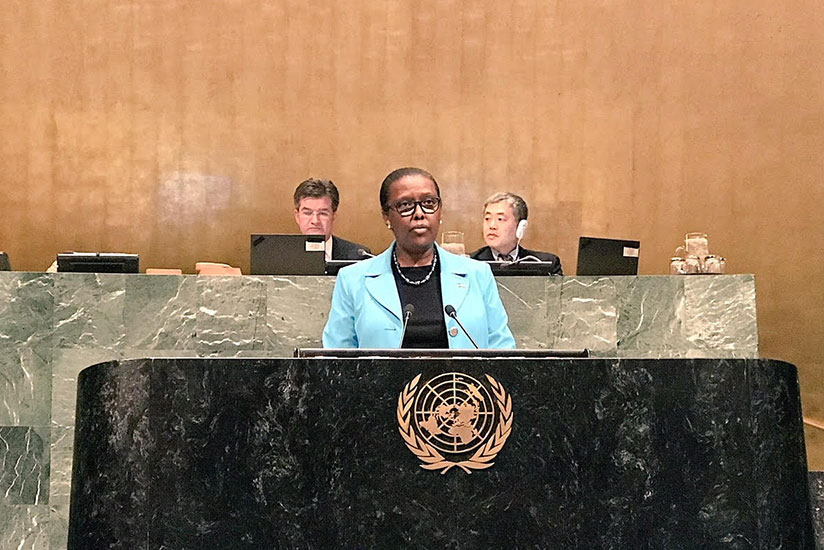The United Nations General Assembly on Friday unanimously adopted a decision on the 'International Day of Reflection on the 1994 Genocide against the Tutsi in Rwanda,' a decision that corrects inaccuracies that existed in the previous resolution, A/RES/58/234, which omitted to name the Tutsi as the group targeted for extermination.


The United Nations General Assembly on Friday unanimously adopted a decision on the "International Day of Reflection on the 1994 Genocide against the Tutsi in Rwanda,” a decision that corrects inaccuracies that existed in the previous resolution, A/RES/58/234, which omitted to name the Tutsi as the group targeted for extermination.
This was at the 77th plenary meeting of the UN General Assembly on sport for development and peace, and on causes of conflict and promotion of durable peace and sustainable development in Africa.
While introducing the draft decision, Amb. Valentine Rugwabiza, Rwanda’s Permanent Representative to the UN, said that the decision aimed to correct historical inaccuracies contained in the previous resolution adopted 14 years ago.
She stressed that the unanimous adoption of the decision by the UN General Assembly, is a strong statement that the UN will not be a platform for genocide denial and revisionism.
Amb. Rugwabiza further stressed that the present decision on the International Day of Reflection on the 1994 Genocide against the Tutsi in Rwanda, is a tribute to the inalienable dignity of the victims, and the courage and resilience of the survivors of the 1994 Genocide against the Tutsi.
She said: "The text captures the historical facts of what happened in 1994, which is a‘Genocide against the Tutsi in Rwanda’ and leaves no room for ambiguity.”
Historical accuracy and words are vital while referring to the Genocide, she said.
"The tactics of Genocide denial and revisionism are well known and documented. Some people, mostly those who were involved by action or omission, promote the theory of double Genocide in the futile belief that such suggestion might divert their own responsibility,” she noted.
Educative opportunity for future generations
According to Amb. Rugwabiza, the day of reflection "offers us as members of the international community” an opportunity to consider the factors that lead to such mass atrocity and "renew our collective pledge” of "never again”.
She said that it serves as an educative opportunity for future generations to equip them in fighting all forms of hate and Genocide ideology.
More importantly, she said, in these worrying times where we witness increase in expressions of divisionism, extremism and hatred in many parts of the world, it sends a clear message that the United Nations is a platform for the promotion and protection of human dignity of all people and will not serve as a platform for any form of Genocide denial or revisionism.
Amb. Rugwabiza added: "The day of reflection is to among others continuously awaken greater awareness of the international community on the value of life and humanity, the ill effects of genocide and to renew our collective commitment to protect and uphold fundamental human rights.
It provides us with an opportunity to reflect on lessons learnt from the failure of the international community to prevent and stop the execution of the Genocide against the Tutsi. It is highly regrettable that despite numerous resolutions condemning Genocide denial adopted by this esteemed assembly, we continue to see genocide denial and revisionism widespread around the world”.
Speaking on behalf of the African Group, one of the five regional groups in the UN, Amb Anatolio Ndong Mba, Permanent Representative of Equatorial Guinea to the UN, said they welcome the adoption by consensus of the draft decision.
Amb Mba said it was the least they could do to honor the memory of the children, women and men brutally murdered 24 years ago and to remember all the victims of "this tragic and dark chapter of our history.”
"At this moment, we stand with the Rwandan people and salute the huge strides they have made to recover from that unspeakable event to shape a bright future for the country,” the diplomat said.
The UN Regional Groups are the geopolitical regional groups of UN member states. Though unofficial, these bodies act as voting blocs and negotiation forums. The African Group is the largest group, with 54 members and 28 percent of the votes in the UN General Assembly.
Unless the world remembers the lessons learned from the experience of Rwanda, he said, "We will never live up to our pledge” to ensure that other countries do not face the pain and suffering that Rwanda endured.
"The African Union has embedded these lessons in its Pan African values of solidarity and unity, as well as in its core principle of non-indifference enshrined in its Constitutive Act.”
editorial@newtimes.co.rw


